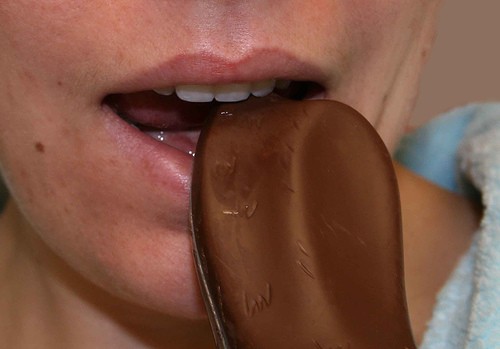
Eating sweets
Candies, gum, cakes, biscuits, chocolates and any other type of sweets, contain sugar and other carbohydrates that can damage your teeth if you eat them regularly. Bacteria present in your mouth break down all those sugars into several compounds, including acidic compounds. When these acids are in contact with your teeth, they damage the enamel, causing demineralization. It only takes about 20 minutes of being in contact with your teeth for the acids to start eroding them. Due to a change in the conditions of your mouth, eating sweets can also cause the growth of bacteria that can cause cavities and other mouth infections.
- Important notification about information and brand names used in this slideshow!
- Photo courtesy of Brandy by Flickr : www.flickr.com/photos/dieselbug2007/450862855/
- www.webmd.com/oral-health/features/your-teeth-bad-habits
- http://dentistmiami.com/blog/dental-health-mistakes/
- http://pittsburgh.cbslocal.com/2011/08/19/summertime-activities-can-cause-damage-to-teeth/
- http://integrateideas.com/dental/blog/your-teeth/
- http://static.cnhi.zope.net/birmingham/metro/pressrepublican/health-mind-body/_article0036.html
- TOUGER-DECKER, R. & VAN LOVEREN, C. 2003. Sugars and dental caries. Am J Clin Nutr, 78, 881S-892S.
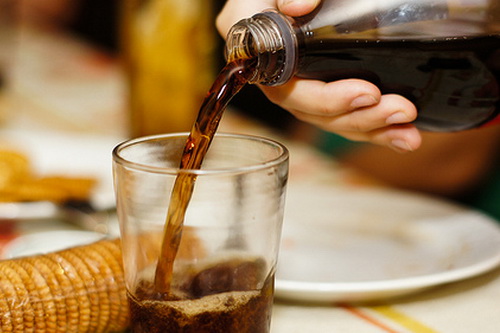
Drinking soda, especially cold
Soda might be a very refreshing beverage, but it is one of the unhealthiest drinks you can have. Teeth damage caused by soda is similar to that caused by cocaine and meth, due to its high content in sugars and phosphoric and citric acid. Sugars present in soda contribute to the production of acids by bacteria, and at the same time, citric and phosphoric acids, which don’t need to be processed by mouth bacteria, can directly destroy the enamel of your teeth. Finally, soda promotes the formation of stains on your teeth by stimulating the growth of plaque bacteria. Plaque stays on your teeth as a covering layer, giving them a not very nice yellowish colour.
- Important notification about information and brand names used in this slideshow!
- Photo courtesy of João André O. Dias by Flickr : www.flickr.com/photos/jdrephotography/8095178135/
- www.dentistry.net/dental-nutrition/soda-on-teeth/
- http://rt.com/usa/diet-soda-teeth-meth-963/
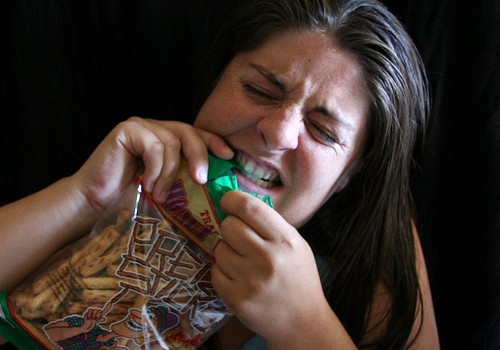
Using teeth as tools
You might be tempted to use your teeth to open a bottle of beer or a bag of chips, to tear a piece of fabric, or even to hold something with them, because both of your hands are busy. Well, think it twice the next time, because even though your teeth feel strong and hard, as if they could resist anything, this is not the case. Your teeth are only designed for chewing food and make it smaller, so your stomach doesn’t have a hard time processing it. They can’t resist high pressures and when exposed to them, they can be cracked or broken. A broken tooth might not hurt, but sometimes, the damage can affect the tooth nerve, causing from mild to intense pain.
- Important notification about information and brand names used in this slideshow!
- Photo courtesy of latisha (herbmother) by Flickr : www.flickr.com/photos/bohomisfit/4587989604/
- www.colgate.com/app/CP/US/EN/OC/Information/Articles/Oral-and-Dental-Health-Basics/Dental-Emergencies/Dental-Emergencies/article/Fractured-and-Broken-Teeth.cvsp
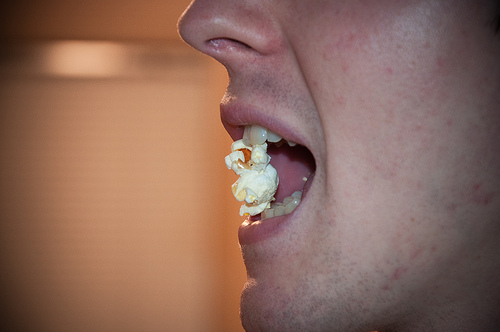
Crunching popcorns
Who doesn’t like to crunch popcorns? Well, this habit can lead you to loose a tooth or two. Crunching popcorn is the perfect example of subjecting your teeth to a great amount of pressure, more than to what they are designed to resist. Crunching popcorn can cause a fracture or can break a tooth. Fractures and broken teeth are treatable, but you will certainly not avoid the pain. Cracks and fractures can also increase teeth sensitivity, making it painful when you eat or drink cold and hot beverages. If you face a broken tooth situation, go to your dentist as soon as possible.
- Important notification about information and brand names used in this slideshow!
- Photo courtesy of Brandon Koger by Flickr : www.flickr.com/photos/bkoger/6822484148/
- www.colgate.com/app/CP/US/EN/OC/Information/Articles/Oral-and-Dental-Health-Basics/Dental-Emergencies/Dental-Emergencies/article/Fractured-and-Broken-Teeth.cvsp
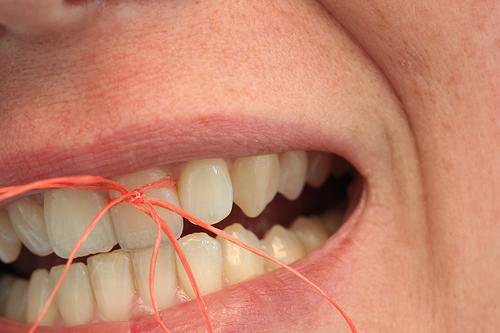
Not brushing or flossing your teeth regularly
No matter what, you should consider making brushing and flossing a daily habit. The American Dental Association recommends you to brush your teeth twice a day, and floss them once a day. Look up for the technique you have to follow to properly brush your teeth, even the ones that might seem unreachable by the toothbrush, to keep them strong and shiny. You don’t have to spend half an hour on this activity; 2 minutes will do the job. The ADA also recommends using toothpaste with fluoride, as it prevents cavities and protects the enamel. Don’t’ forget to change your toothbrush every three months and visit your dentist regularly.
- Important notification about information and brand names used in this slideshow!
- Photo courtesy of Nicole Hanusek by Flickr : www.flickr.com/photos/nhanusek/3765555331/
- www.mouthhealthy.org/en/
- http://www.ada.org/

Teeth grinding
Have you ever woken up with jaw pain? Or, have you noticed that you tend to grind your teeth when you are under certain situations? The medical term used for teeth grinding is bruxism, and it is mainly caused by stress and anxiety. Apart from causing headaches, earache and jaw pain, teeth grinding can contribute to damaging your teeth by wearing them down. Most people grind their teeth while they sleep, although other situations can make you do this consciously. If you tend to grind your teeth, wear a mouth guard or a mouth splint to avoid it. Also, try to do some relaxation therapies to reduce the stress that is causing it.
- Important notification about information and brand names used in this slideshow!
- Photo courtesy of fiahless by Flickr : www.flickr.com/photos/fiahless/35439026/
- www.nhs.uk/conditions/teeth-grinding/Pages/Introduction.aspx
- http://www.mayoclinic.com/health/bruxism/DS00337

Swimming in the chlorinated pool
Chlorine used to prevent bacterial and algae contamination of pools can damage the enamel of your teeth. How? When in contact with water, chlorine produces two acids, hydrochloric and hypochlorous acids. These two, together with cyanuric acid, keep water of pools suitable for swimming. When water is not properly chlorinated, the concentration of these acids can be so high that, when in contact with your teeth, the water erodes the enamel and causes demineralization. There are some cases that have been reported where regular swimmers present teeth damage due to chlorine in pool water. So, be careful and when swimming, make sure the water has been properly treated.
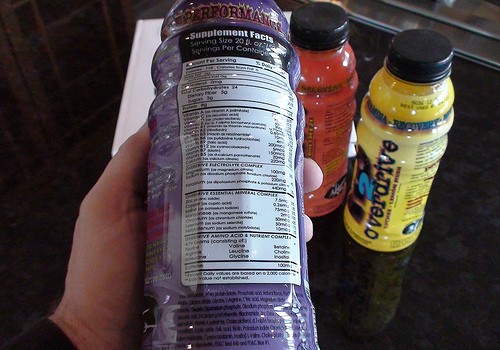
High consumption of sports drinks
Sports drinks have become very popular in the last few years, specially because they offer a tastier alternative of hydration when exercising, compared to water. However, they are not as good as they sound. According to a chart published by the Harvard School of Public Health, 100 ml of a sports drink can contain as much as 270 calories, or 15 teaspoons of sugar. These beverages with high sugar content promote the formation of plaque and an acid environment that affects the enamel of your teeth. If you like sports drink, try not to drink them on a regular basis, and choose the healthier option instead, water.
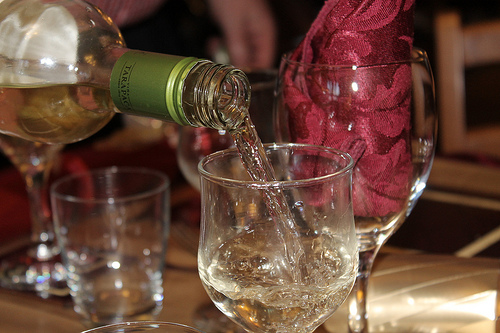
Drinking white wine
It is known that red wine stains your teeth due to the presence of colored substances that adhere to the enamel. But how can white wine harm your teeth? Well, it has to do again, with acids present in it. In a study conducted at New York University, scientists noticed that white wine makes your teeth vulnerable by altering the enamel layer that protects them, promoting the formation of stains when in contact with other beverages, such as coffee or tea. So, even though drinking a glass of wine everyday is a common advice to stay healthy, try not to make it a habit in order to keep your teeth white as pearls.
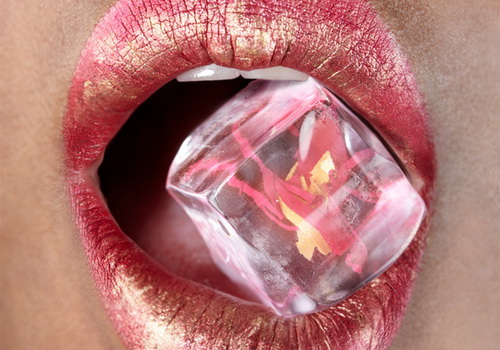
Chewing ice
Don’t tell me that you have never felt tempted to chew the ice after finishing your cold drink. This is a habit that almost everybody does, without thinking how harmful it is to our teeth. Even though it is only water, ice is very hard and can provoke fractures or even break a tooth, not only causing pain, but also making it necessary for you to pay a visit to one of your biggest fears, the dentist. So, next time you want to chew ice, remember that your teeth are not as strong or pointy as an ice pick and certainly shouldn’t be used as one.
- Important notification about information and brand names used in this slideshow!
- Photo courtesy of Neonlace by Photobucket : media.photobucket.com/user/Neonlace/media/1237681253223174.jpg.html?filters[term]=ice%20mouth&filters[primary]=images&filters[secondary]=videos&sort=1&o=12
- www.colgate.com/app/CP/US/EN/OC/Information/Articles/ADA/2006/article/ADA-07-Chew-On-This.cvsp




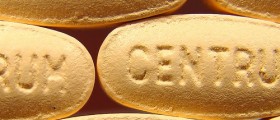
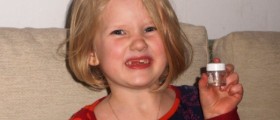

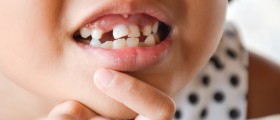






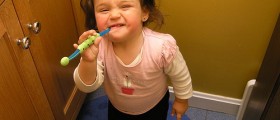


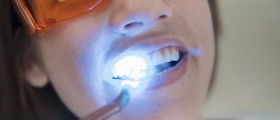
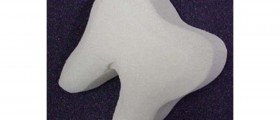
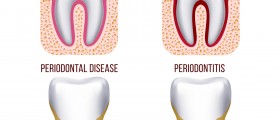
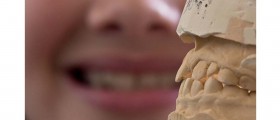

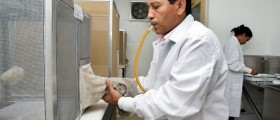
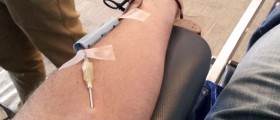



Your thoughts on this
Loading...